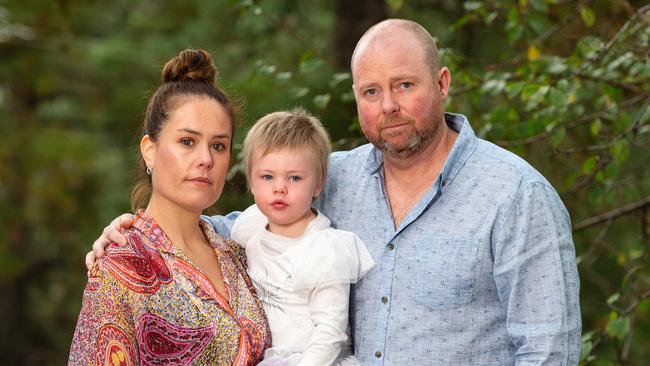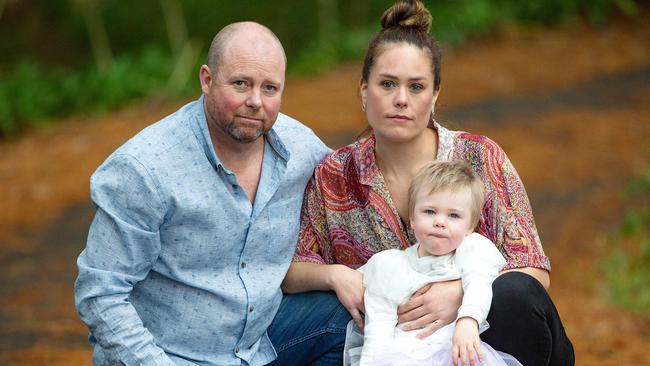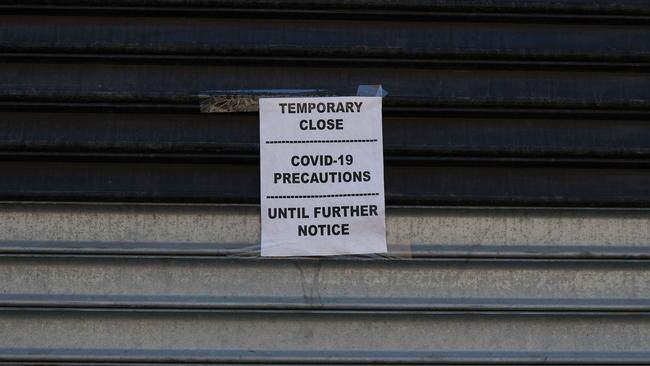More than 100 businesses have failed since COVID-19 struck Victoria
More than 130 Victorian businesses have gone bust since the coronavirus crisis began, but experts warn the true economic horror is yet to come. See the full list of companies that have closed in the past three months.

HS Coronavirus News
Don't miss out on the headlines from HS Coronavirus News. Followed categories will be added to My News.
More than 130 Victorian businesses have plunged into liquidation or voluntary administration since the coronavirus crisis began, but experts warn the true horror is still yet to hammer the economy.
From March 23, at least 136 Victorian companies have gone into voluntary administration or liquidation.
Liquidators say the current upheaval is just the calm before the storm - while Treasurer Tim Pallas expects it will take years for the state to recover.
Mr Pallas yesterday told a parliamentary inquiry into the government’s response to COVID-19 the tourism, major events and international education had suffered major damage.
A modest economic improvement could happen next year but a full recovery would take longer.
“I suspect that we will see as a consequence of these events is substantial economic trauma.
“Unfortunately we expect things, quite frankly, to get much worse before they get better, and we’re expecting an unprecedented fall in activity over the next six months.”
COVID-19 LATEST: SCHOOL CLOSURES HAD ‘MINIMAL IMPACT’
Mr Pallas said sporting and major events would be hard hit and that international education was one of the state’s biggest exports.
“On the other hand Victoria has a very strong services sector, which has been able to continue to work from home and our big build, which supports thousands of jobs.
“The building construction industry have done a mammoth job putting in place COVID-compliant work arrangements with, which has kept essentially one in 10 workers in the state gainfully employed.”
Treasury modelling had predicted a 40 per cent decline in the state’s economy over the next six months.
Worrells Victoria Partner Scott Andersen said the crisis was “touching everyone — there’s no escaping it”.
It had accelerated a move to online trading and may signal the end for many bricks and mortar business, Mr Andersen said.
“Because of the financial shock through high unemployment people won’t be frequenting hospitality or retail venues as much as they were pre-crisis...Which means when the stimulus lifts there could be months where they aren’t receiving relief and sales won’t have recovered.”
He said: “People might have to look at their business viability and alter their business - instead of having multiple shop fronts they could seek to keep the diamond and lose the rest.”
The ones in most danger were businesses that carried debt into the crisis.
“This is absolutely uncharted territory.”
BDO Business Restructuring Partner, Nicholas Martin, warned the stimulus package had created a “false dawn”.
“Some businesses may need to make difficult decisions – do they push on or bow out gracefully? This requires a robust analysis of the business’ viability and available capital.
Mr Martin said: “The stimulus package and concessions may have created a false dawn for many businesses. It would be a great pity to see businesses wrestle their way through lockdown, exhaust their capital, commence a restart, and then find that the sheer weight of deferrals has created a mountain of debt that can’t be paid, exposing the equity in the family home.”
John Winter, the CEO of the Australian Restructuring Insolvency and Turnaround Association said the government subsidies allowed companies to survive that would have been wound up under normal conditions.

CAFE DREAMS CRUSHED
Adam and Leni Moodie had hoped to have run their Doncaster East cafe for much longer — until COVID-19 came along.
Evangeline’s Cafe — named after their daughter — opened in 2018. It closed last month, one of a wave of Victorian businesses.
“We put our heart and soul into that cafe,” Mr Moodie said.
The couple styled the restaurant as a traditional, homely cafe with a French twist, and kept it running with a skeleton staff for as long as they were able to.
With businesses able to run as insolvent under temporary rules introduced since the crisis, Mr Moodie said they were able to “keep the doors open and generate income”.
But it couldn’t last and the Moodies had to place the cafe into voluntary administration.
Mr Moodie said the “wounds were still fresh”.
“We’re not sure what direction to go in, we’re a little scarred by this whole business,” he said.
Mr Moodie thought the restrictions imposed on cafes ging forward —- with limited customer numbers and social distancing — would place the hospitality industry under immense pressure.
“It’s going to put further burden on those businesses emerging from this crisis,” he said.
JobKeeper had been problematic as well.
“We were going to go through that process to pay the eligible staff, but we discovered we would have to borrow money to pay staff up front before the reimbursement came from the government ... who has got the money for that?”
Mr Moodie said there would be “a real struggle” ahead.
“Once this six-month moratorium on insolvencies is lifted, these businesses will be by definition insolvent and forced into liquidation or administration. It’s going to be awful,” he said.

BLOODBATH LOOMS FOR OWNERS
Guiseppe Pafumi has made the tough call to close his Seaford mechanic business because he could see things were going to get a lot worse.
“This is only just the beginning. There is an old accounting saying ‘your first loss is your best loss’, which means get out when you can,” Mr Pafumi said.
He said the government subsidies and schemes such as rent freezes would only last so long. And with work fading away, there would be no revenue to pay any of it back, let alone stay afloat.
“You’ll never recover lost revenue … I have friends in the insolvency arena and they are predicting a bloodbath.
“It took eight years for us to recover from the GFC — this will take us 10.”
Mr Pafumi put his Avanti Mechanical Group into liquidation because “I couldn’t afford to keep the doors open, it was costing me $1200 a day”.
In six weeks he estimated he lost about $60,000.
“I’m only a small business so I can’t afford that,” he said.
Trade had faded to almost nothing so it wasn’t sustainable. Mr Pafumi was now looking for work, along with three technicians and a delivery driver.
SWIFT CHANGE FOR ROYCE HOTEL
The impact of the pandemic on the travel industry has been illustrated by the fall of Melbourne accommodation businesses.
The company managing the five-star boutique hotel The Royce in South Yarra near the Royal Botanic Gardens went into liquidation last month.
Andrew Reginald Yeo and Gess Michael Rambaldi were appointed liquidators for Royce Hotel Management Pty Ltd.
The 100-room hotel on St Kilda Rd, which reportedly sold in 2017 for $60 million, remains open.
The hotel’s general manager, Nick McLennan, told the Herald Sun it was business as usual after the building owner took control of the hotel and it was still taking bookings.
Mr McLennan said the hotel, which boasts a stunning 1920s Art Deco facade, was now being run independently of the previous owner.
Also last month, Lynx Apartments Pty Ltd, Nest Melbourne Pty Ltd and Gardenhurst Apartments Pty Ltd appointed Paul Vartelas as liquidator.
Editor’s note: A previous version of this story contained a logo of restaurant outlet Schnitz. That logo has been removed from the story. The Herald Sun wishes to make it clear that Schnitz stores are open for business and the Herald Sun is not aware of any Schnitz store that has suffered financial difficulty as a result of the Coronavirus pandemic.
MORE NEWS:
SOLUTION TO THE WEST GATE TUNNEL’S TOXIC SOIL ISSUE
PROBE TO EXAMINE IF CEDAR MEATS PUT WORKERS IN DANGER

